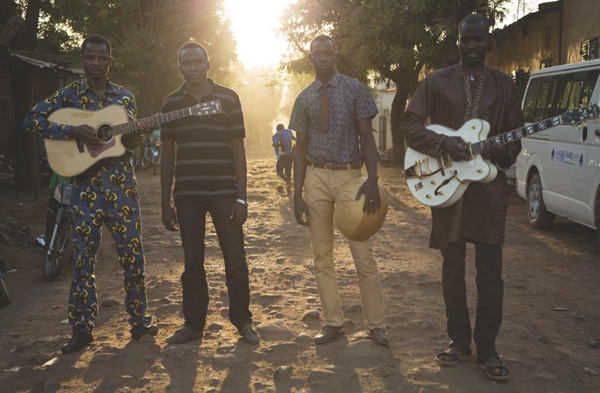They Will Have to Kill Us First: Malian Music in Exile presents an intriguing case study. It’s a well-meaning, well-made documentary that tracks the various paths taken by musicians exiled from northern Mali after Islamist Jihadist have taken over, and it follows their return, after the militants are defeated. The music is fantastic, and the musicians have fascinating stories, but the music takes second place as the film really focuses on life under extreme Shariah law, providing a look at the real-life events that were dramatized in Abderrahmane Sissako’s feature film Timbuktu.
First off, it runs too long at 100 minutes. There are some compelling moments, such as a woman describing the restrictive life under the new regime and footage of a disturbing amputation, but viewers eventually feel as though there are treading over the same ground after seeing repetitive shots of a young man speeding on his moped through a city with a guitar on his back. There is also a sense of remove between the camera and the subject.
It’s certainly not the subjects’ fault because a) they are just living their lives and b) they are compelling people. We meet Khaira Arby, an elder stateswoman of Malian music who leaves Timbuktu; Fadimata Walett Oumar, nicknamed “Disco” for her love of Madonna, who fears returning to northern Mali; guitarist Moussa Sidi, who had to leave his wife behind in the jihadist controlled territories; and the young band Songhoy Blues, led by Aliou Touré, a charismatic young singer whose father worked with the Malian guitar legend Ali Farka Touré.
All of their stories are crosscut and occasionally intertwined as they wait and hope impatiently for France to come in and kick the jihadists out (no real spoiler, they do). Eventually viewers are treated to a couple of concerts at the end, but it’s a long way to go as everybody sits and waits and pontificates.
As a result, there is a dry, dispassionate feel to the piece. All the passion is in lowercase. And it stands in stark contrast to the larger-than-life personalities chronicled. Even through their sadness, they manage to punch through with humor and anger and, of course, music. Absolutely terrific music. It’s a shame that the filmmakers didn’t capture more of that passion on film.
Directed by Johanna Schwartz
English, French, Songhay, Bambara and Tamashek, with English subtitle
Released by BBC Worldwide
UK. 105 min. Not rated







Leave A Comment